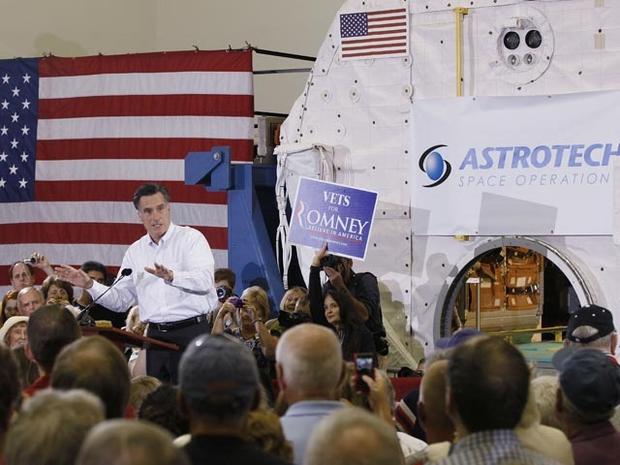Romney more grounded than Gingrich on the Space Coast
TITUSVILLE, Fla. -- In sharp contrast to Newt Gingrich's lofty plans to colonize the moon, Mitt Romney came to Florida's Space Coast on Friday with an approach seemingly more grounded in the reality of constrained federal budgets.
Speaking to about 150 people at Astrotech Space Operations in Titusville, Romney told the crowd, "It's time to have a mission for the space program of the United States of America." He declined to offer more specifics, but said he would not pander in order to achieve that goal.
"In the politics of the past, to get your vote ... I'd come here and promise hundreds of billions of dollars," Romney said. "Or I'd lay out what my mission is: here's what we're going to accomplish. I'm not going to do that. I know that's something that's very attractive, very popular, but it's simply the wrong thing to do. It's not the way that the best decisions are made."
Romney said his background in the private sector precluded him from blindly promising money to the space program, as had been done in the past. "Politicians love the idea of coming in and saying what they're going to do without having studied it, without having carried out the analysis, and gotten the data, done the hard work," he said.
Romney said he would team up with the military and leading astrophysicists to determine NASA's future. Earlier in the day, his campaign released a list of leaders in the space community endorsing Romney, which included Bob Crippen, pilot of the first shuttle mission, and Michael Griffin, a former NASA administrator who staunchly opposed the end of the shuttle program.
When the program ended this past July, an estimated 8,000 to 10,000 jobs were lost in this part of Florida, between the Kennedy Space Center and surrounding local businesses. Titusville itself had been shuttered after the Apollo program ended in the 1970s, only to be resurrected once the shuttle program began about a decade later. Now, it has again been shell-shocked by the huge job drain.
In 2006, President George W. Bush decided to retire the shuttle program, citing budgetary concerns . President Obama upheld the decision, hoping that taking the space program off the federal budget would encourage private companies to reach for the stars themselves -- the first commercial spacecrafts are currently hoped to take off in 2015. As a result, the United States has no manned space program of its own at the present time.
